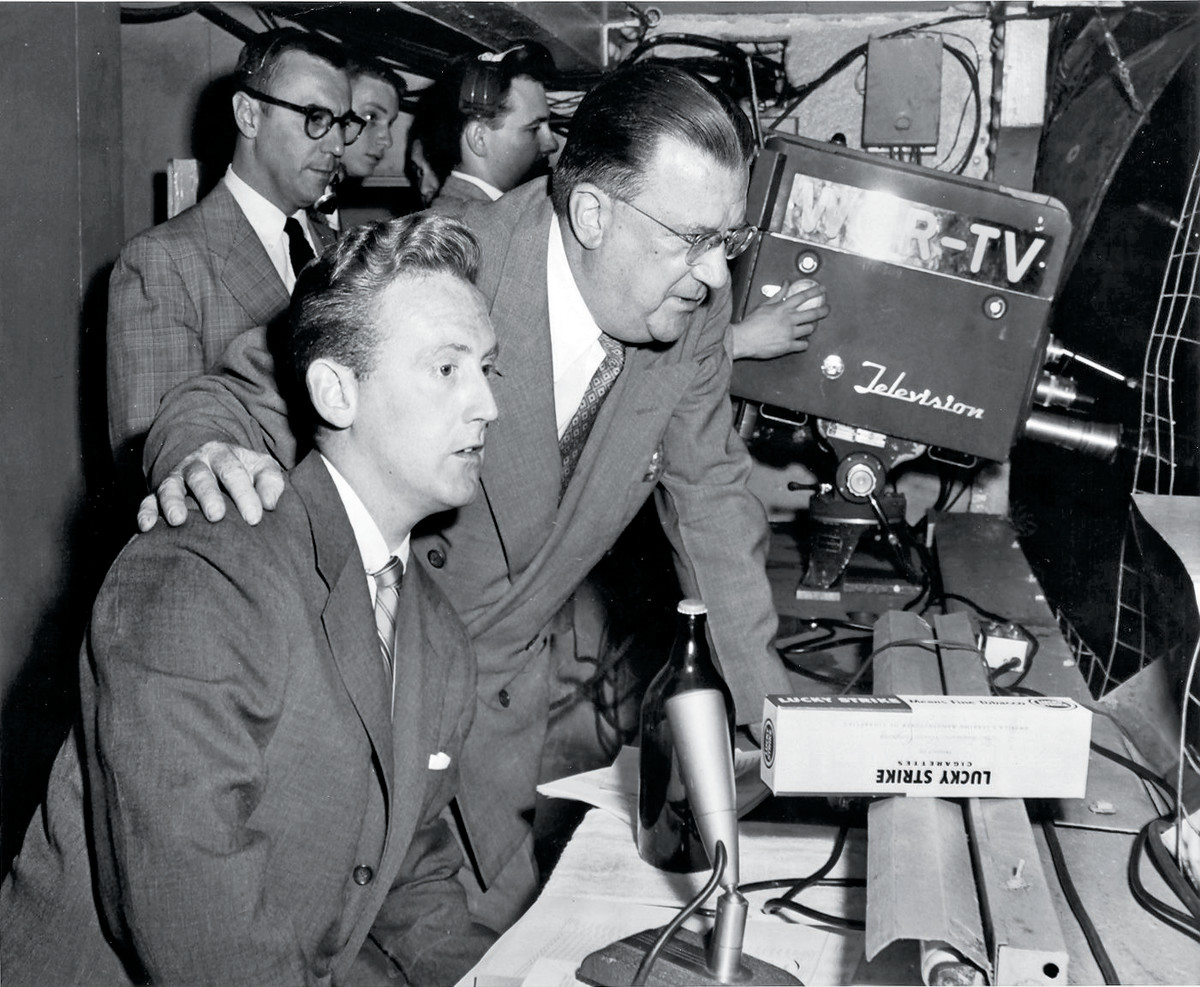The Smaller Vin Scully Made Himself, the Larger He Became
The phone rang two days before Christmas, a Los Angeles area code, and the unmistakable voice on the other end said from some sun-kissed aerie in Pacific Palisades: “Steve, this is Vin Scully.”
“Of course this is,” I replied. “Who else could this possibly be?”
“Well, I always introduce myself,” said Scully, “because I never know who knows me.”
Everyone in Southern California knew Scully, who died on Tuesday at age 94. And still he introduced himself every night on Dodgers broadcasts, the team whose games he called for 67 years, in what became a kind of papal benediction: “Hi, everybody, and a very pleasant good evening to you wherever you may be. It’s time for Dodger baseball.”

On that day in 2013, he was calling to thank me for some published encomium I’d written about him, just as he’d previously written a thank-you note on a creamy, stiff note card embossed with his home address in that mellifluous enclave, Pacific Palisades, a municipality whose name was meant for him to say out loud. Years later—in keeping with the era; he always remained contemporary—he sent me an all-caps email of gratitude, a print version of his speaking voice: “I AM HIGHLY HONORED AND GREATLY HUMBLED BY YOUR MORE THAN GENEROUS REMARKS. ...”
His emails were all-caps but his voice was Times New Roman: classic, ageless. He liked to quote Roy Campanella: “You gotta have a lot of little boy in you.”
But he also remained a courtly man from a courtlier age; Vincent Edward Scully, born in the Bronx and raised in the Washington Heights neighborhood of Manhattan. From earliest childhood, he heard disembodied voices that called to him from his living room, beckoning from some baseball beyond. “We had that big four-legged radio,” he once told me as if describing a Steinway grand piano, “with a cross piece underneath to give support for the legs, and I was about 8, and I’d take a pillow and I would crawl under the radio so the speaker was right over my face, and the roar of the crowd came out of the speaker like water from a showerhead. I would get goosebumps from head to toe."
VERDUCCI: The Beautiful Life of Vin Scully
His life changed forever when he was 8 years old, as he recounted on one Dodgers broadcast six years ago, while Matt Moore pitched for the Giants against the Dodgers. The Dodgers are trailing 5–1 in the top of the sixth. We’ll let Vin tell the story:
“On this day, October the second, 1936, a little redheaded kid was walking home from school, went by a Chinese laundry and—I’ll tell ya the rest of the story, but let’s get back to the game. ... We’ll talk about the redheaded kid in a minute, but right now another redheaded kid is getting into the box: Justin Turner, followed by Seager and Puig. So you can see how the game is so constructed for you. I’m telling about a little redhead, and here’s Turner. Remarkable production. And the first pitch to Justin way inside ball one. Yeah, the little kid, not quite 9—8 and three-quarters—leaving grammar school, on his way home, and I went by a Chinese laundry—that’s way outside, two balls and no strikes—and the line score of a baseball game was pasted on the, on the window, and it showed Game 2 of the World Series, with the Yankees beating the Giants 18 to 4, as Turner fouls the ball back. There it was, Game 2, imagine, a reserved seat cost five bucks. Well anyway, that little redheaded kid looked and saw, oh, poor Giants. That was my reaction. And so I became not only a Giants fan, but a big fan of baseball. And I was able to exercise my instinct—the pitch to Turner is away, 2-and-1—because my school was less than 20 blocks to the old Polo Grounds, where the New York Giants played. And because I was a member of the Police Athletic League, Catholic Youth Organization, I could get in a game free from Monday to Friday. We’d get out of school at 2:30, Giants games were at 3:15, and so I could go to the ballgame. And so I just fell in love with baseball. Most of the time I was in center field. Now center field in the Polo Grounds was 483 feet away, as Turner strikes out one down. So I would sit in the bleachers and I would cheer and I would watch and I just loved the Giants. Well, the point of the whole story is this: My first love was October the second, 1936, second game of the World Series. Today is October the second, 2016. A lot of time has gone by, exactly 80 years to the minute from the day I looked at the line score of that World Series.”
Here, the analog clock at AT&T Park in San Francisco confirmed it was 2:04 Pacific time.
“So when I looked at the schedule and I knew I was going to retire, I thought: I have to do that game,” Vin said. “It was as if it was ordained that I would do this game.”

He attended Fordham in the Bronx—with another Vin Scully, who would become a Pittsburgh attorney, but that’s a story for another day, and Vin had a boundless storehouse of stories—and came to fame in that evocative borough to the east of Manhattan, calling Brooklyn Dodgers games on WMGM radio and WOR-TV with Red Barber and Connie Desmond, beginning in 1951. He was still living with his mother in Bogota, N.J., when he woke up one morning at age 25, ate the breakfast his mother prepared for him, threw it all up and then drove himself to Ebbets Field, paralyzed with nerves, to call his first World Series game in a voice already barrel-ripened for baseball.
That voice conveyed his humility. Scully had a self-effacing instinct that always failed, for the smaller he made himself, the larger he became. He is remembered, among many other calls, for failing to describe Henry Aaron’s 715th home run, after which he removed his headphones and walked to the back of the booth so as not to talk over the action. His mentor, Red Barber, taught him two things: “Shut up and slow up.”
When he did speak, Scully said, “What a marvelous moment for the country and the world. A Black man is getting a standing ovation in the Deep South for breaking a record of an all-time baseball idol. And it is a great moment for all of us, and particularly for Henry Aaron.” Having been friends with Jackie Robinson, he knew the magnitude of the moment.
VERDUCCI: Get to Know Vin Scully, the Man Behind the Mic
He had also survived his own tragedies. Scully’s first wife, Joan, died at age 35, and his son Michael died at age 33. Yet he never indulged in self-pity. If you’re going to ask “Why me?”, he once said, then you also have “to ask the same question when good fortune comes my way: ‘Why me?’ Why, with the millions and millions of more deserving people, would a redhaired kid with a hole in his pants and his shirttail hanging out playing stickball in the streets of New York wind up in Cooperstown? Why me indeed?”
That was at his Hall of Fame ceremony, when he received the Ford C. Frick award in 1982, 34 years before his retirement in 2016, so that he was a Hall of Famer less than halfway through his career. The first half of that career included football—his final NFL game was the 1981-82 NFC championship game, Niners over Cowboys, when Joe Montana threw to Dwight Clark for The Catch, and Vin said: “It’s a madhouse at Candlestick.” That was his final football game—literally a mic drop moment—but he also did seven straight Masters on CBS, so that he could have had an entire glittering career if he’d never called a single baseball game.

In later years, his map contracted. Like certain rare flowers, Scully wasn’t found east of the Rockies, preferring to do games only on the West Coast and in Phoenix. Then he cut out Arizona and did only the games in California. When I asked him, nearly 60 years after the Dodgers moved to Los Angeles, when he was last in Brooklyn, he said: “The last time I was in Brooklyn was the last game ever played there.”
The reason for all this: He wanted to be home with his wife, Sandi, and their grandkids. As Scully once said of his family, “They pay the bill of loneliness when I’m away.” The hours he dreaded on the road were those spent sitting alone in a hotel room, far from loved ones.
Of course, everyone loved him. He resisted the efforts to have streets named after him, and to record outgoing voicemails at wedding receptions, but was otherwise accommodating to fans and fellow members of the press. In every conversation with Scully in the little dining area in the back of the Vin Scully Press Box at Dodger Stadium—not all his efforts to resist being memorialized were successful—Vin sipped from a paper cup of coffee while poring over his game notes. It was like watching Toscanini tune his own piano: “Hi, everybody, and a very pleasant good evening to you …”

A few days before he served as grand marshal of the Tournament of Roses Parade in 2014, I congratulated him on the phone and he sighed and said: “This year at the front of the parade, next year at the back with a broom.” But even the sigh had a musical quality. Scully’s sigh was unmistakable. When I told him so, he laughed and changed the subject.
In death, his voice doesn’t fall silent, for it lives on in endless recordings and in the eternal hereafter of YouTube. Indeed, now that Vin has joined the celestial choir—the analogies are apt for the Catholic boy with the golden pipes—his voice travels with him, as broadcast signals travel through space. Somewhere, someone in the firmament is always being wished a very pleasant good evening, courtesy of Vin Scully—St. Vinny of Wherever You May Be.
More MLB Coverage:
• The Beautiful Life of Vin Scully
• The Padres Are the Ideal Team for Baseball Fans
• MLB Trade Deadline Winners and Losers
• After Soto Trade, Crushed Nats Clubhouse Left to Root for Padres
• Grading the Juan Soto Trade
